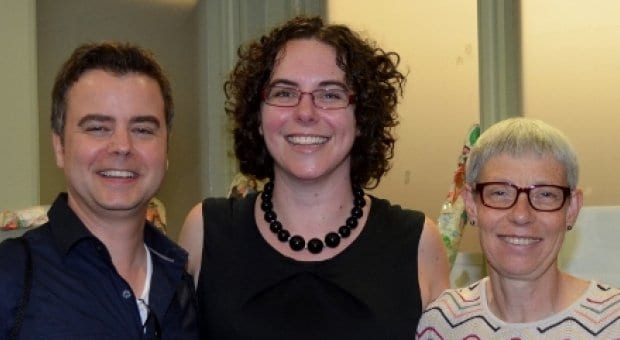The Centretown Community Health Centre (CCHC) got a little bit gayer June 25 when three community members were elected or reelected, bringing the board’s gay presence up to nearly half.
Openly gay board members Jean-Pascal Beaudoin and John Fletcher were elected to first terms, while Holly Wagg was reelected to her third and final two-year term as treasurer. They will join Linda Wilson, elected at the 2012 AGM, and Jeff Morrison, who will once again serve as board president.
“I think it speaks to the value that the gay community in Ottawa has with respect to Centretown,” Morrison says of the gay representation on the board. “I think it shows that the gay population is interested in our work and values the services. I think the community, by the fact that they elected five members in total, understands that a strong LGBT representation is important.” “I’m heartened by it, I welcome it, and of course, that will help us continue Centretown’s strong programming for the gay community.”
In his president’s report, Morrison highlighted the awards CCHC won in 2012 for its queer programming. Morrison also cited CCHC’s efforts to make hormones more accessible to trans Ottawans through the Trans Health Connection as an example of the centre’s commitment to gay and trans issues.
Future programming includes a gay cooking class and an Inside Out film night, and CCHC is seeking queer individuals who have experience with schizophrenia or psychosis for a study in partnership with the Schizophrenia Society of Ontario. CCHC’s gay zone, which offers free, anonymous HIV testing once a week, also hopes to launch a “men in recovery” group in the near future.
Morrison reveals that there are murmurs that Gay Zone may be expanding in the future and that it is “possibly looking at an expansion of the night. But it’s all too early to say,” he says.
Expansion is a hot topic at CCHC, as the centre’s lease expires in 2014. With its increase in programming, the centre says it needs to expand. But the decision whether to remain at its current location or move rests with the Ministry of Health, Morrison says. CCHC has requested additional capital funding from the ministry and has set a deadline of September for a response. The Champlain Local Health Integration Network (LHIN) has committed to bankrolling any additional operations funding associated with new space. “We’re still fighting that fight,” Morrison says. “Yasir Naqvi, our MPP, has been very active trying to push that with the minister of health. But we still don’t know yet.”
CCHC’s financials for the fiscal year ending March 31 show it received more than $11 million in grants, to end the period with net revenue of $77,959. However, it lost $495,088 when the Ministry of Health moved the diabetes regional coordinating centre from CCHC to the LHIN.
“They did make sure to hire the staff we had hired, which was a benefit to our region,” CCHC executive director Simone Thibault explains. “But it was a loss because they were really amazing staff.”
Wagg hopes to implement new fundraising strategies as treasurer but says a needs assessment is required to “figure out the best way to structure that program.”
“Do we start to test-pilot a couple of fundraising activities or events? Do we look at giving resources to staff appropriately first?” Wagg asks. “We’re very conscientious of the best approach to do it but also the impact that that could have on other community organizations, as well, by fundraising from the same pool of donors.”
As a co-founder of Camp Ten Oaks, which serves queer youth and children from gay families, Wagg says she was initially drawn to seek a position on the CCHC board after the centre partnered with Ten Oaks to deliver the Rainbow Families program.
“It was the first organization to really step forward and acknowledge that families have a place in the queer community in Ottawa,” she says. “Before that there was absolutely nothing.”
When second-year board member Wilson became a client of CCHC more than 30 years ago, she says, there were virtually no openly gay environments. She says she is pleased to see that sexual orientation is not as big an issue today but is interwoven into society and the work the centre does.
“I’m very impressed by the work done at this centre to deal with issues that in many other parts of our society still get swept under the rug. A good example of that is the work that’s been done in the past year to assist trans people with hormones. That’s something the majority of society and here in Ottawa has no clue about.” Although the majority of CCHC staff do not identify as trans or queer, they are aware that this is the population they serve, and Wilson finds this openness “impressive.”
“That openness is not just to sexual orientation, but culture, background and issues like homelessness. People of every background and every kind of situation can find a connection here,” she says.
Additional board members elected include Cathy Doolan, Tamsyn Farr and June Webber, who will join returning directors Tracey Donaldson, Isabelle Lamontagne, Wynn Quon and Tong Zhao-Ansari.


 Why you can trust Xtra
Why you can trust Xtra


